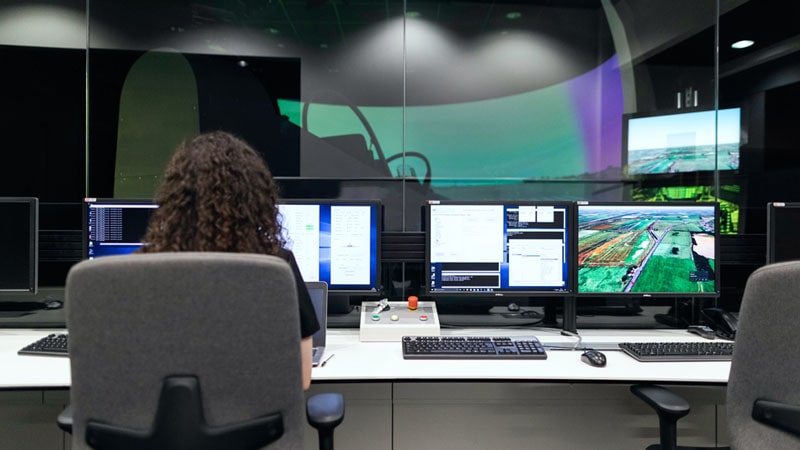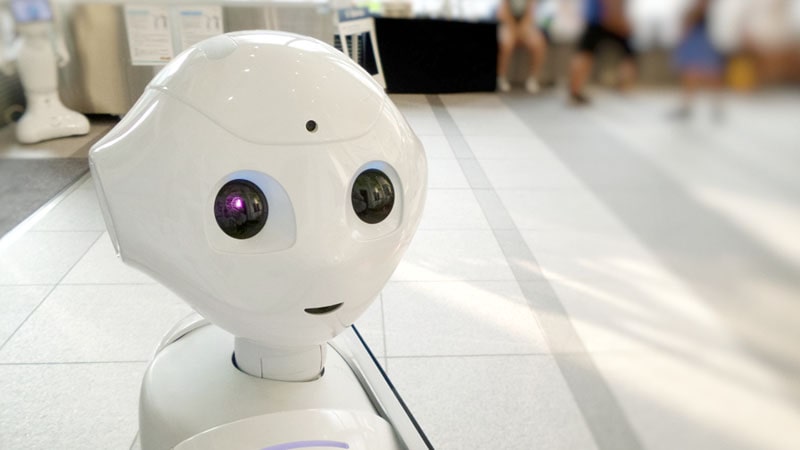Artificial Intelligence (AI) can revolutionise how we do business. The role of artificial intelligence in business is a rapidly evolving technology that can potentially transform how we work across various industries.
It involves using algorithms and computer programs to analyze data, learn from it, and make decisions based on that learning. The concept of AI has been around for decades, but recent advancements in machine learning, natural language processing, and other areas have accelerated its development.
Artificial Intelligence plays a critical role in what has been dubbed the Fourth Industrial Revolution, which is characterized by the fusion of digital, physical, and biological systems. The impact of AI on various industries has been significant, and it has the potential to revolutionise how we live and work in the coming years.
In this article, we’ll explore how AI is being used in various business domains and the challenges and opportunities it presents. Are you curious about it? Read them below right now.
What is Artificial Intelligence
Artificial intelligence (AI) is the emulation of human intelligence in devices designed to think and behave like people. It can improve efficiency, speed, and accuracy in business processes, providing insights and predictive analytics to help organizations make better decisions. AI is already being used in various industries, including healthcare, finance, manufacturing, and retail, to name a few.
AI in Healthcare

The healthcare industry faces many challenges, including rising costs, aging populations, and a need for more qualified medical professionals. Artificial Intelligence is making significant strides in transforming the industry and improving patient outcomes.
AI is having a substantial impact on diagnosis and therapy, for example. AI-powered tools can analyze patient data, including medical records and imaging scans, to identify potential health problems and provide treatment recommendations.
For example, AI algorithms can help doctors identify signs of cancer on mammograms or analyze MRI scans to detect signs of brain tumors. This can lead to earlier diagnosis and more effective treatment, ultimately improving patient outcomes.
The role of Artificial Intelligence healthcare business is also being used to streamline healthcare management and administration. By automating routine tasks like appointment scheduling and medical record-keeping, healthcare providers can free up staff time and reduce the risk of errors. This can lead to better patient care and improved efficiency for healthcare organizations.
There are already several successful applications of Artificial Intelligence in healthcare. For example, IBM’s Watson for Oncology has been used to provide treatment recommendations for cancer patients, and the FDA has approved an AI-powered tool to help detect diabetic retinopathy.
However, there are concerns about the ethical implications of using AI in healthcare. For example, there are concerns about privacy and data security and the potential for bias in AI algorithms. Healthcare organizations need to take these concerns seriously and work to address them as they develop and implement AI-powered tools.
AI in Finance
The finance industry faces many challenges, including market volatility, regulatory compliance, and the need to make informed investment decisions. It is helping transform the industry by providing tools that can analyze vast amounts of data and make predictions based on that data.
One area where AI is making a significant impact is in financial analysis and decision-making. AI-powered tools can analyze market trends, news articles, and other data sources to give investors insights into market movements and potential investment opportunities.
Artificial Intelligence is also being used to detect and prevent financial fraud. By analyzing large amounts of data and identifying unusual patterns, AI can help financial institutions see fraudulent activity and prevent losses. There are already several successful applications of AI in finance. For example, JPMorgan Chase has developed an AI-powered system that can analyze legal documents and extract meaningful information, saving time and reducing the risk of errors.
However, there are concerns about the potential for AI to replace human, financial advisors. While AI can provide valuable insights and analysis, financial institutions must ensure that human advisors continue to play a critical role in providing personalized advice and support to clients.
AI in Retail
The retail industry faces many challenges, including the need to stay competitive in a rapidly changing market and meet consumers’ expectations. AI is helping transform the industry by providing tools that can analyze customer data, personalize experiences, and improve supply chain management.
One area where artificial intelligence is making a significant impact is customer service. AI-powered chatbots and virtual assistants can provide personalized assistance to customers, answering questions and providing recommendations based on their preferences.
The role of Artificial Intelligence is also being used to personalize the shopping experience for customers. By analyzing customer data, AI can provide personalized recommendations for products and promotions, helping to increase customer loyalty and sales. AI also improves supply chain management by providing real-time insights into inventory levels, assisting retailers in reducing waste and optimising their supply chain.
However, there are concerns about the potential for Artificial Intelligence to exacerbate existing inequalities in the retail industry. For example, there are concerns that AI-powered systems may reinforce biases in hiring and promotions. Retailers must be mindful of these issues as they employ AI-powered solutions and take steps to overcome them.
AI in Manufacturing

The manufacturing industry faces many challenges, including reducing costs, improving efficiency, and increasing quality. AI is helping transform the industry by providing tools that can automate routine tasks, predict maintenance needs, and improve quality control.
One area where the role of artificial intelligence is making a significant impact is in the manufacturing process itself. AI-powered machines can analyze data in real-time to optimize production processes, reducing waste and improving efficiency.
Artificial Intelligence is also being used to predict maintenance needs and prevent breakdowns in manufacturing equipment. By analyzing sensor data and other indicators, AI can identify potential issues before they cause equipment failure, allowing for proactive maintenance and reducing downtime. It can lead to significant cost savings for manufacturers.
Artificial Intelligence is also improving quality control in manufacturing. AI-powered systems may identify flaws and irregularities in items using computer vision and other technologies, making it possible to offer only high-quality products to clients. This can lead to increased customer satisfaction and improved brand reputation.
Nonetheless, there are worries about the possibility of job losses brought on by greater factory automation. job loss due to increased automation in manufacturing. Manufacturers need to work with employees to ensure they are equipped with the skills required to work alongside AI-powered machines and continue to play a critical role in manufacturing.
AI in Business Operations
Artificial intelligence is used to optimize supply chain management, inventory control, and logistics, among other operational tasks, through custom software. For example, Amazon and Walmart use AI algorithms to forecast demand, optimize inventory, and reduce shipping times. AI is also being used to improve quality control in manufacturing and automate routine tasks in administrative processes.
AI in Customer Service

AI-powered chatbots and virtual assistants improve customer service by providing 24/7 support and faster response times through mobile or web apps. For instance, companies like H&M and Sephora use AI-powered chatbots to help customers find products, answer frequently asked questions, and purchase. These chatbots can also provide personalized recommendations based on customers’ browsing history and preferences.
AI in Marketing and Sales
Artificial Intelligence is being used for targeted advertising, personalized recommendations, and predictive analytics, among other marketing and sales tasks. For example, platforms Netflix and Spotify use AI to recommend movies and music to their users based on their viewing and listening habits.
AI algorithms can also analyse customer data to identify patterns and trends, allowing businesses to make decisions on data-driven product development, pricing, and promotions.
AI in Product Development
The role of artificial intelligence in this industry is being used to accelerate product development and improve design, among other product development tasks. For example, companies like Nike and Ford use AI to design and test new products more quickly and efficiently. AI algorithms can also analyze customer feedback to identify areas for improvement and inform future product development.
Challenges and Concerns

While artificial intelligence presents many opportunities for businesses, there are also challenges and concerns to consider. One of the biggest concerns is job displacement, as AI algorithms can automate many tasks humans previously performed. Another concern is the ethical implications of AI, such as the potential for bias and discrimination in algorithms.
Businesses must use AI responsibly and ethically to address these issues and train and assist any employees who may be impacted by automation.
Future Outlook
The future of AI in business is promising, with many new applications and opportunities on the horizon. For example, AI is being used to develop new drugs and treatments in healthcare and improve cybersecurity in finance and other industries.
As AI continues to evolve and mature, businesses that embrace it will be well-positioned to stay ahead of the competition and provide better products and services to their customers.
Takeaways
The role of artificial intelligence has the potential to improve efficiency, reduce costs, and improve customer outcomes. As technology continues to evolve, industries need to stay up-to-date with the latest advancements and work to address any concerns or issues that arise. The future is bright for AI, and it has the potential to revolutionize the way we live and work in the coming years.
However, businesses must also be aware of AI’s challenges and concerns and work to address them responsibly and ethically. With the right approach, companies can harness the power of AI to drive growth, innovation, and success.
If you need personal assistance to help you choose what Artificial Intelligence is for your business, Upscalix can help. We are a Melbourne-based digital solution company that has helped many businesses leverage their value through AI.
You don’t have to be tech-savvy since we will provide full assistance from beginning to end. Drop us a call right now and gain more profit!













